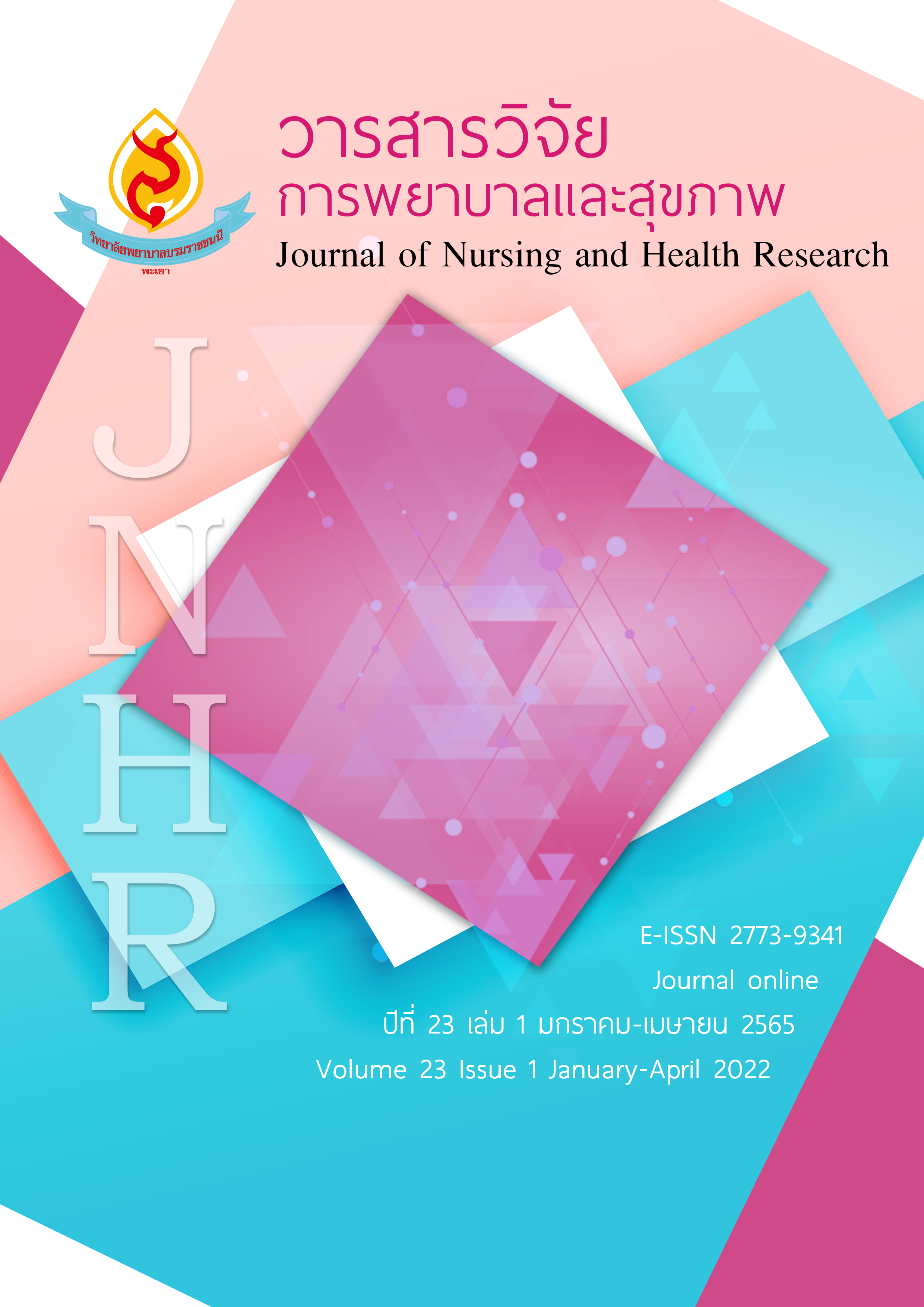การตีตราทางสังคมต่อผู้ที่อาจติดเชื้อหรือติดเชื้อ COVID-19 และผลกระทบ: การศึกษาเชิงคุณภาพ
คำสำคัญ:
การตีตราทางสังคม, ผลกระทบการตีตราทางสังคม, ผู้ที่อาจติดเชื้อ COVID-19, ผู้ที่ติดเชื้อ COVID-19บทคัดย่อ
การวิจัยเชิงคุณภาพแบบเชิงพรรณนา มีวัตถุประสงค์เพื่อเพื่ออธิบายเกี่ยวกับการตีตราทางสังคมต่อผู้ที่อาจติดเชื้อหรือติดเชื้อ COVID-19 และผลกระทบ เลือกกลุ่มตัวอย่างแบบเฉพาะเจาะจงจำนวน 17 ราย ประกอบด้วย ผู้ติดเชื้อจำนวน 2 ราย และผู้ที่เกี่ยวข้องจำนวน 15 ราย เครื่องมือที่ใช้ในการรวบรวมข้อมูลคือแบบสัมภาษณ์เจาะลึกชนิดกึ่งโครงสร้าง วิเคราะห์ข้อมูลโดยใช้วิธีการวิเคราะห์เนื้อหา ผลการวิจัยพบว่า การตีตราทางสังคมและผลกระทบของผู้ที่อาจติดเชื้อหรือติดเชื้อ COVID-19 แบ่งเป็น 6 ประเด็นหลัก ดังนี้ 1) ความหมายการตีตราทางสังคม ประกอบด้วย 2 ลักษณะหลัก ได้แก่ ถูกสังคมรังเกียจและการถูกตำหนิ/ถูกนินทา/ถูกกล่าวโทษ 2) สาเหตุของการตีตราทางสังคม ประกอบด้วย 5 ประเด็นย่อย ได้แก่ ขาดความรู้ ความกลัวและหวาดระแวง การเชื่อข่าวลือ สับสนในข้อมูลข่าวสาร และ ความเชื่อที่ผิดๆ 3) ลักษณะการตีตราทางสังคม ประกอบด้วย 3 ประเด็นย่อย ได้แก่ การตั้งท่ารังเกียจ การพูดตำหนิหรือนินทาหรือกล่าวโทษ และปฏิเสธการให้เข้าร่วมกิจกรรมในชุมชน 4) ผลกระทบของการถูกตีตราทางสังคม ประกอบด้วย 2 ประเด็นย่อย ได้แก่ ผลกระทบเชิงลบต่อ จิตใจ เศรษฐกิจ และสังคม ผลกระทบเชิงบวก ได้แก่ เพิ่มความตระหนักเกี่ยวกับการป้องกันโรคโควิด-19 เกิดชีวิตวิถีใหม่ในชุมชน พัฒนาความสามารถในการแก้ปัญหาของชุมชน และการยอมรับในการปฏิบัติหน้าที่ของอาสาสมัครสาธารณสุข 5) วิธีการลดการตีตราทางสังคม ประกอบด้วย 3 ประเด็นย่อย ได้แก่ การสื่อสารสร้างความรู้และความเข้าใจ ส่งเสริมให้มีชีวิตวิถีใหม่ และชุมชนมีส่วนร่วมลดการตีตราทางสังคม และ 6) การปรับทัศนคติของผู้ถูกตีตราทางสังคม ประกอบด้วย 2 ประเด็นย่อย ได้แก่ การให้อภัย และการปรับความคิดเชิงบวก ผลการวิจัยมีประโยชน์ในการกำหนดนโยบายเกี่ยวกับการลดการตีตราทางสังคมและการพัฒนาแนวทางเพื่อลดการตีตราทางสังคมของผู้ที่ติดเชื้อหรืออาจติดเชื้อโควิด-19 ที่สอดคล้องกับบริบทของพื้นที่
เอกสารอ้างอิง
กรมควบคุมโรค. (2563). คําแนะนําการป้องกันควบคุมโรคไวรัสโคโรนาสายพันธุ์ใหม่ 2019 สําหรับสถานศึกษาสถานการณ์การระบาดในวงกว้าง ระยะเริ่มต้น. สืบค้นเมื่อ 12 เมษายน 2563, จาก https://ddc.moph.go.th/viralpneumonia/file/introduction/introduction07_1.pdf
กรมควบคุมโรค. (2564). โรคติดเชื้อไวรัสโคโรน่า 2019 (COVID-19) สถานการณ์ในประเทศไทย. สืบค้นเมื่อ 12 พฤษภาคม 2564, จาก https://ddc.moph.go.th/covid19-dashboard/?dashboard=main
กรมสุขภาพจิต กระทรวงสาธารณสุข. (2563). แนวทางการสร้างวัคซีนใจ เพื่อให้เกิดภูมิคุ้มกันในชุมชน. สืบค้นเมื่อ 22 เมษายน 2563, จาก https://www.dmh.go.th/covid19/news1/view.asp?id=13
นิยดา เกียรติยิ่งอังศุลี, สุรางค์รัตน์ จำเนียรพล, นิมิตร์ เทียนอุดม, ศยามล เจริญรัตน์ และสุภัทรา นาคะผิว. (2556). การเลือกปฏิบัติในการประกอบอาชีพของผู้ติดเชื้อเอชไอวี. กรุงเทพมหานคร. สถาบันวิจัยสังคม จุฬาลงกรณ์มหาวิทยาลัย.
ศีลธรรม เสริมฤทธิรงค์, พจนา ธัญญกิตติกุล และชุติวัลย์ พลเดช. (2561). การทบทวนวรรณกรรมอย่างเป็นระบบ: ผลของการตีตราต่อผู้เป็นโรคเรื้อน วัณโรค และผู้ติดเชื้อเอชไอวี/ผู้เป็นโรคเอดส์. วารสารควบคุมโรค, 44(1), 66-77.
สำนักงานสาธารณสุขจังหวัดพะเยา. (2564). ศูนย์บริหารสถานการณ์ COVID-19 จังหวัดพะเยา. สืบค้นเมื่อ 30 ธันวาคม 2564, จาก https://www.pyomoph.go.th/backoffice/files/41587.jpg
สุภลักษณ์ ธานีรัตน์, เมทนี ระดาบุตร, สุจิรา, วิเชียรรัตน์ และศิริพร โอภาสวัตชัย. (2563). กลยุทธ์เพื่อลดการตีตราทางสังคมในสถานการณ์ covid-19. วารสารเกื้อการุณย์, 27(2), 164-174.
Adom, D., Mensah, J. A.., & Osei, M. (2021). The Psychological distress and mental health disorders from COVID‐19 stigmatization in Ghana. Social Sciences & Humanities, Open 4, 100186 https://doi.org/10.1016/j.ssaho.2021.100186
Bos, A. E. R., Pryor, J. B., Reeder, D., & Stutterheim, S. E. (2013). Stigma: advances in theory and research. Basic and Applied Social Psychology, 35(1), 1-9. http://dx.doi.org/10.1080/0197 3533.2012.746147
Bruns, D. P., Kraguljac, N. V., & Bruns, T. R. (2020). Covid-19: facts, cultural considerations, and risk of stigmatization. Journal of Transcultural Nursing, 31(4): 326–32.
Chew, C., Lim, X., Chang, C, Rajan, P., Nasir, N & Low, W. (2021). Experiences of social stigma among patients tested positive for COVID-19 and their family members: a qualitative study, BMC Public Health, 21(1623), 1-11. https://doi.org/10.1186/s12889-021-11679-8
Fiorillo, A., & Gorwood, P. (2020). The consequences of the COVID-19 pandemic on mental health and implications for clinical practice. European Psychiatry, 63(1), e32, 1–2. https://doi.org/10.1192/j.eurpsy.2020.35
Gronholm, P.C., Nosé, M., van Brakel, W.H., Eaton, J., Ebenso, B., Fiekert, K., Milenova, M., Sunkel, C., Barbui, C., & Thornicroft, G. (2021). Reducing stigma and discrimination associated with COVID-19: early stage pandemic rapid review and practical recommendations, Epidemiology and Psychiatric Sciences 30 (e15), 1–10. doi: 10.1017/S2045796021000056.
Kamdi, P. S. & Deogade. M. S. (2020). The hidden positive effects of COVID-19 pandemic. International Journal of Research in Pharmaceutical Sciences, 11 (SPL) (1), 276-279. https://doi.org/10. 26452/ijrps.v11iSPL1.2712
Miles, B. W. & Jozefowicz, D. (2010). Naturalistic inquiry. Research method in the social science. Retrieved December 20, 2021, from https://www.researchgate.net/publication/215788544
Sanders, C. (2003). Application of Colaizzi’s method: Interpretation of an auditable decision trail by a novice researcher, Contemporary Nurse, 14(3), 292-302, doi: 10.5172/conu.14.3.292
Sotgiu, G. & Dobler, C. C. (2020). Social stigma in the time of Coronavirus. European Respirator Journal, 56(2002461), 1-3. https://doi.org/10.1183/13993003.02461-2020
Tejativaddhana, P., Suriyawongpaisal, W., Kasemsup, V & Suksaroj, T. (2020). The roles of village health volunteers: Covid-19 prevention and control in Thailand. Asia Pacific Journal of Health Management, 15(3), i477, doi: 10.24083/apjhm.v i5i3.477.
Villa, S., Jaramillo, E., Mangioni, D., Bandera, A., Gori, A & Raviglione, M. C. (2020). Stigma at the time of the COVID-19 pandemic. Clinical Microbiology and Infection, 26 (11), 1450-1452. https://doi.org/10.1016/j.cmi.2020.08.001
World Health Organization, United Nations Children's Fund and International Federation of Red Cross and Red Crescent Societies. (2020). Social stigma associated with the Coronavirus Disease COVID-19. Retrieved December 24, 2021, from https://www.who.int/publications/i/item/social-stigma-associated-with-covid-19
World Health Organization. (2021). Thailand's 1 million village health volunteers - “unsung heroes” - are helping guard communities nationwide from COVID-19. Retrieved December 24, 2021, from https://www.who.int/thailand/news/feature-stories/detail/thailands-1-million-village-health-volunteers-unsung-heroes-are-helping-guard-communities-nationwide-from-covid-19
Worldometers. (2021). Covid-19 Corona virus pandemic. Retrieved December 24, 2021, from https://www.worldometers.info/coronavirus/?fbclid=IwAR2Ldxd3-Z2tf2Pbqwv2p8dTea4 Q9Cs7nFXVyUPzjaGLCPl106lIabaq5gk
ดาวน์โหลด
เผยแพร่แล้ว
รูปแบบการอ้างอิง
ฉบับ
ประเภทบทความ
สัญญาอนุญาต
ลิขสิทธิ์ (c) 2022 วารสารวิจัยการพยาบาลและสุขภาพ

อนุญาตภายใต้เงื่อนไข Creative Commons Attribution-NonCommercial-NoDerivatives 4.0 International License.



